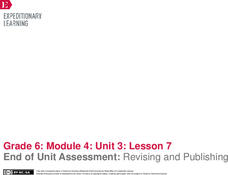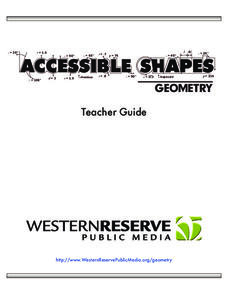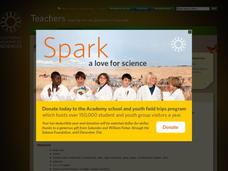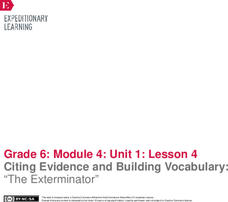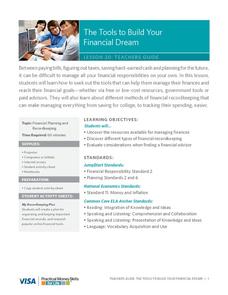EngageNY
End of Unit Assessment: Revising and Publishing
Dictionaries, thesauruses, word walls, oh my! Pupils use several resources to revise their position papers to include appropriate vocabulary. Then, after peer editing, scholars write the final drafts of their essays and self-assess using...
The Alamo
The Alamo - Remembering Through Education
Help young historians truly remember the Alamo with a comprehensive set of informational text about the Texas Revolution. Complete with important vocabulary, biographies of prominent historical figures, thorough timelines of events, and...
National Wildlife Federation
Get Your Techno On
Desert regions are hotter for multiple reasons; the lack of vegetation causes the sun's heat to go straight into the surface and the lack of moisture means none of the heat is being transferred into evaporation. This concept, and other...
Skyscraper Museum
What is a Skyscraper?
Skyscrapers are amazing feats of architectural design that create the iconic skylines of the world's biggest cities. Young architects explore the defining characteristics of these monstrous towers with the first lesson in this four-part...
Virginia Commonwealth University
General Construction Measurement and Dimensions
Learners construct their understanding of measurement and dimensions in this step-by-step approach that begins with an all group vocabulary introduction, consisting of measuring objects and dialoging using measurement vocabulary....
PBS
Accessible Shapes
All the 2-D and 3-D measurement work you need is in one location. Divided into three sections, the geometry lesson plans consist of visualization of three dimensions, classifying geometric figures, and finding surface area and volume....
DiscoverE
Coding Without Computers
See what it feels like to be a robot. Scholars use programming vocabulary to program a human robot and test out their codes by acting them out. The code should result in stacking six cups into a pyramid.
Chicago Teachers Union Quest Center
Factored Form of a Quadratic Function
Build upon linear functions to learn about quadratics. The lesson introduces the concept of zeros for quadratic functions and makes the connection to the linear factors of the function. It presents quadratics in both graphical and...
Ohio Resource Center
Clouds
Get your little readers moving with a fun lesson about Eric Carle's Little Cloud. After reading the book together, they engage in a series of locomotor and manipulative activities to illustrate how different elements of the story would...
EngageNY
Identifying How Text Features Support Arguments: “The Exterminator"
Half and half. Split the class in half to gain a full understanding of sidebars. Pupils work in groups to discuss sidebars in text. Half of the groups read Seriously Sick, and the other half reads Killer Genes. They read using...
It's About Time
Properties of Matter
Never trust an atom; they make up everything! Young chemists make modeling dough and add another ingredient to change the properties. Scholars then compare the properties of emulsion to composite materials. A reading passage and analysis...
Ned Show
Rainbow Fish and the Big Blue Whale
If friendship were a soup, what ingredients would be in it? As part of a study of Marcus Pfister's Rainbow Fish and the Big Blue Whale, kids engage in a series of friendship-themed activities using materials contained in this richly...
United Nations
Compost Monitor Training
What should go in the trash, and what can be composted? Guide your young conservationists through the process of composing their trash with a activity about the different ways we can dispose of garbage. Using a trash bag with clean...
Foundation for Water & Energy Education
What is the Water Cycle? Activity B
Curious physical scientists follow a lesson on the properties of water with this lesson on distillation. They observe a miniature water cycle model that filters dirty water into clean water. These two lessons combined are an enriching...
WindWise Education
How Does a Windmill Work?
Can my windmill pick up a weight? Given the same set of materials, groups design and build the most efficient windmill. On the first day, groups concentrate on getting a windmill to spin, while on the second day, they modify their...
California Department of Education
In the Interview Hot Seat
Interviews can be so stressful. How does someone stay calm and confident in the interview hot seat? Senior job seekers get acquainted with common interview questions during the fifth of six career and college readiness lessons....
Southern Poverty Law Center
Evaluating Reliable Sources
A lesson plan instills the importance of locating reliable sources. Scholars are challenged to locate digital sources, analyze their reliability, search for any bias, and identify frequently found problems that make a source unusable.
Virginia Department of Education
Weather Patterns and Seasonal Changes
Get your class outside to observe their surroundings with a lesson highlighting weather patterns and seasonal changes. First, learners take a weather walk to survey how the weather affects animals, people, plants, and trees during...
Virginia Department of Education
Solar System Model
How many planets can you name? Did you get all 13 in our solar system, including the dwarf planets, or were you surprised when you read there are 13 planets? The lesson helps scholars understand the scale of the universe including the...
California Academy of Science
Greening Your Middle School
Middle schoolers redesign their school to make it more energy efficient, and create a model of their design. Learners get together in groups of 5, and they take on the task of making their school more energy efficient. To do this, they...
EngageNY
Citing Evidence and Building Vocabulary: “The Exterminator”
It is an out-of-body experience. Scholars take a look at the sidebars outside the body of the text in The Exterminator. They discuss the purpose of this type of text feature and work to determine the gist. Learners write unfamiliar...
EngageNY
Building Background Knowledge: Jigsaw to Build and Share Expertise about the 2010 Haiti Earthquake, Part 2
Calling all experts! Using the educational resource, pupils work together in small expert groups, reading an article about the 2010 Haiti earthquake. As they read, they record two main ideas and supporting details from the text.
Visa
The Tools to Build Your Financial Dream
When it comes to all the ways money management and financial responsibility weave into our daily lives as adults, make sure students are prepared to locate resources for managing their finances, such as a financial advisor.
EngageNY
Getting the Job Done—Speed, Work, and Measurement Units II
How fast is your class? Learners determine the amount of time it takes individuals to walk a given distance and calculate their speeds. Pupils solve distance, rate, and time problems using the formula and pay attention to the rate units.


